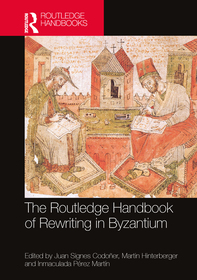
The Routledge Handbook of Rewriting in Byzantium
Series: Routledge History Handbooks;
- Publisher's listprice GBP 230.00
-
109 882 Ft (104 650 Ft + 5% VAT)
The price is estimated because at the time of ordering we do not know what conversion rates will apply to HUF / product currency when the book arrives. In case HUF is weaker, the price increases slightly, in case HUF is stronger, the price goes lower slightly.
- Discount 10% (cc. 10 988 Ft off)
- Discounted price 98 894 Ft (94 185 Ft + 5% VAT)
Subcribe now and take benefit of a favourable price.
Subscribe
109 882 Ft

Availability
Not yet published.
Why don't you give exact delivery time?
Delivery time is estimated on our previous experiences. We give estimations only, because we order from outside Hungary, and the delivery time mainly depends on how quickly the publisher supplies the book. Faster or slower deliveries both happen, but we do our best to supply as quickly as possible.
Product details:
- Edition number 1
- Publisher Routledge
- Date of Publication 28 November 2025
- ISBN 9781032228211
- Binding Hardback
- No. of pages592 pages
- Size 246x174 mm
- Language English 700
Categories
Short description:
The Routledge Handbook of Rewriting in Byzantium presents an overview of the various rewriting processes involved in the production of Byzantine literature.
MoreLong description:
The Routledge Handbook of Rewriting in Byzantium presents an overview of the various rewriting processes involved in the production of Byzantine literature. Due to the lack of recent systematic research on the totality of Byzantine literature, which embraces a long millennium of texts, the fluid concept of ‘rewriting’, here studied for the first time in all its complexity, serves as a unifying criterion for understanding the literary task of the Byzantines. Literature in Byzantium went well beyond the problems of language and genre and was adapted according to the audience and the expectations of the readers, which varied greatly in different periods.
With contributions from 25 scholars, this book analyses and discusses a variety of topics, including: the rewriting of the past, modes of persuasion as a driving force behind rewriting, changing muses, the adaptation of hagiography to changing patterns of behaviour, updating of technical texts, and the necessity for theological and philosophical reinterpretation of inherited texts.
This book will appeal to students and scholars alike interested in Byzantine literature, culture, and literary methods.
MoreTable of Contents:
Introduction
0. Preliminary issues
0.1. Levels of Greek
Martin Hinterberger and Juan Signes Codoñer
0.2. Vocabulary for rewriting in Byzantium
Juan Signes Codoñer
0.3. Tracing the Byzantine authors’ understanding of literary imitation
Elisabeth Schiffer
0.4. Σχέδη, dossiers, συλλογαί, compilations, excerpta
Filippo Ronconi
0.5. “Seeds for our tongue’s and our intellect’s training”: Rewriting and Textual Transmission
Inmaculada Pérez Martín
0.6. Collective Rewriting from Late Antiquity to the Palaiologan Period: An Attempt to Trace Collaboration in Literary, Scientific Projects and Manuscript Production
Andras Németh
1. REWRITING OR INVENTING THE PAST?: Historiography and novel
1.1. The unending (re)writing of history
Juan Signes Codoñer
1.2. Rewriting in Historiography: the evidence of the Proems
Eirene Kiapidou
1.3. Late metaphraseis of Byzantine historiographical texts
Martin Hinterberger
1.4. Reworking, Rewriting, and Mouvance in Late-Byzantine Vernacular Literature
Carolina Cupane and Martin Hinterberger
2. THE PLACES OF PERSUASION: Oratory and rhetoric
2.1. Rewriting Homilies and Homilies Rewriting
Petros Tsagkaropoulos
2.2. The rhetoric of rewriting and the rewriting of rhetoric in John Tzetzes
Aglae Pizzone
2.3. Rewriting letters in Byzantium
Michael Grünbart
3. THE CHANGING MUSES: poetry
3.1. The Reuse of Ancient Epigram in Byzantine Poetry. An Overview
Ugo Mondini
3.2. Prosifying classical verses
David Pérez Moro
3.3. Memory and Rewriting in Schedography: The Cases of Fables and Narratives
Nikos Zagklas
4. SELLING PATTERNS OF BEHAVIOUR: Hagiography
4.1. Same Saints, Different Garments: Hagiographic rewriting before Symeon Metaphrastes
Daria Resh
4.2. Hagiography of the Macedonian period and Symeon Metaphrastes Christian Høgel
4.3. Hagiography of the Palaiologan period
Lev Lukhovitskiy
5. SHARING TECHNICAL COMPETENCE: Law, medicine and science
5.1. Rewriting Byzantine law
Marios Tantalos
5.2. The process of re-writing in the production of acts in the Byzantine world
Raúl Estangüi
5.3. Rewriting in Byzantine Medical Literature
Isabel Grimm-Stadelmann
5.4. Rewriting pharmacological treatises
Mónica Durán
5.5. Rewriting Mathematical and Astronomical Treatises
Fabio Acerbi
5.6. Rewriting Ancient Geography
Paula Caballero
6. THE QUEST OF KNOWLEDGE: Philosophy and theology
6.1. Rewriting Techniques in Byzantine Philosophical Commentaries
Michele Trizio
6.2. The last dogmatic conundrum: transmitting and innovating patristic theology on the Holy Spirit
Alessandra Bucossi
More



